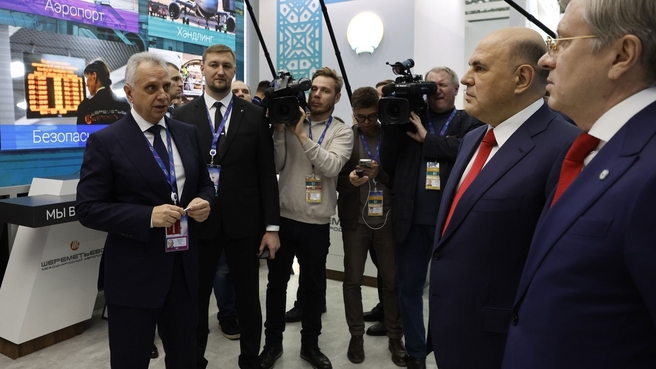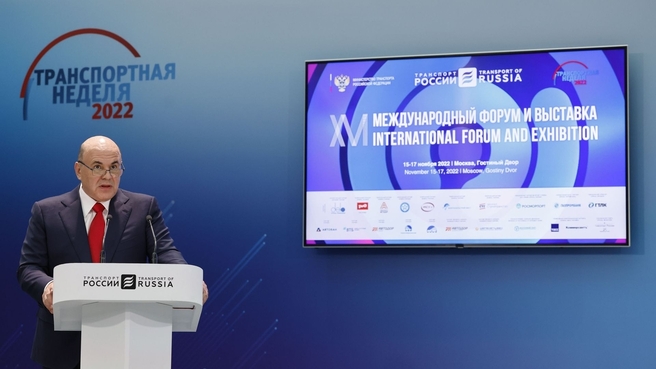The Prime Minister toured the forum’s exhibition, addressed the plenary discussion “Transport of Russia: The growth strategy in the new conditions,” and presented state decorations to transport industry workers.
The Transport of Russia international forum and exhibition is being held on 15‒17 November 2022 during the Transport Week
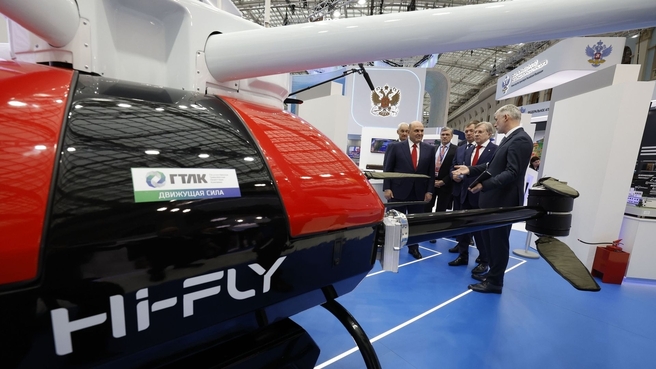
Mikhail Mishustin tours the exhibitions of the 16th Transport of Russia International Forum. With Andrei Belousov, Marat Khusnullin, Minister of Transport Vitaly Savelyev and Director General of the State Transport Leasing Company (GTLK) Yevgeny Ditrikh
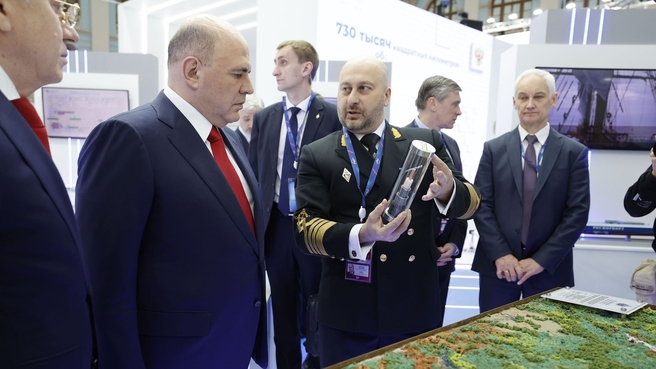
Mikhail Mishustin tours the exhibitions of the 16th Transport of Russia International Forum. With Director of the Federal Agency for Sea and Inland Water Transport Zakhary Dzhioyev
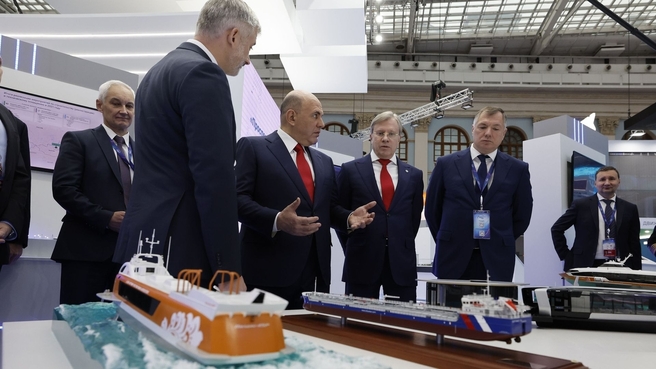
Mikhail Mishustin tours the exhibitions of the 16th Transport of Russia International Forum. With Andrei Belousov, Marat Khusnullin, Minister of Transport Vitaly Savelyev and Director General of the State Transport Leasing Company (GTLK) Yevgeny Ditrikh
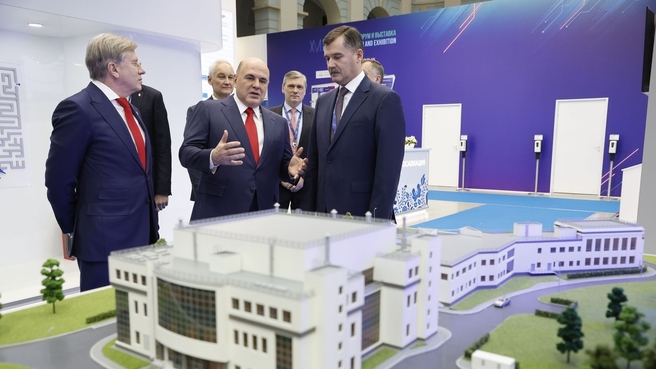
Mikhail Mishustin tours the exhibitions of the 16th Transport of Russia International Forum. With Andrei Belousov, Minister of Transport Vitaly Savelyev and Director of the Federal Air Transport Agency Alexander Neradko
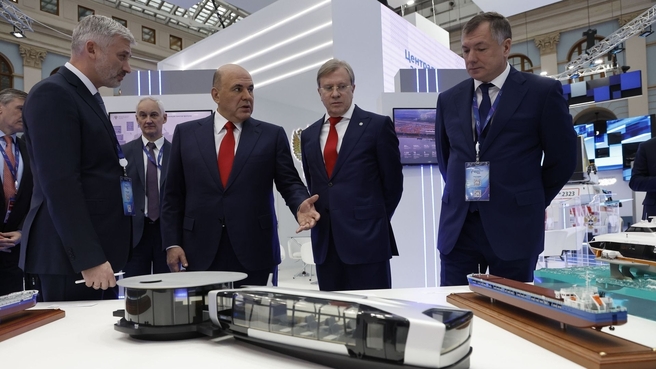
Mikhail Mishustin tours the exhibitions of the 16th Transport of Russia International Forum. With Andrei Belousov, Marat Khusnullin, Minister of Transport Vitaly Savelyev and Director General of the State Transport Leasing Company (GTLK) Yevgeny Ditrikh
Mikhail Mishustin tours the exhibitions of the 16th Transport of Russia International Forum. With Andrei Belousov, Marat Khusnullin, Minister of Transport Vitaly Savelyev and Director General of the State Transport Leasing Company (GTLK) Yevgeny Ditrikh
This year’s forum focuses on the growth strategy for the Russian transport industry in the new conditions. The participants will particularly address the challenges related to the pressure of sanctions, supporting import substitution and technological sovereignty of the Russian transport.
Around 70 companies and organisations are presenting their projects at the Transport of Russia exhibition, highlighting innovative developments in transport and infrastructure. A joint stand of priority projects makes the core of the exhibition.
Mikhail Mishustin's remarks:
Friends, participants, guests: good afternoon.
I am delighted to welcome everyone to this annual international forum. This is the 16th edition of this event, and over the years, it has rightfully become a key business conference in the transport industry. Representatives of dozens of countries around the world have gathered here today to discuss plans for maintaining and increasing the volume of services provided, improving their quality and safety, and prospects for the industry’s overall growth.
The President designated transport infrastructure as one of the main drivers for Russia’s economic development. It provides logistics for business, jobs, as well as comfortable living conditions for people.
In today’s sanctions-dominated reality, it is extremely important to maintain this industry’s stability, to be flexible in responding to changes in the external environment and to act as quickly as possible, taking into account the drastically redirected patterns of the movement of goods, which are predominantly being redirected towards the south and the east.
Thanks to the decisions promptly taken by the President, the transport industry has been able not only to successfully withstand the biggest challenges, but most importantly, to pave the way for future growth, despite all the difficulties we are facing this year.
I would like to note that Russia has been threatened by unfriendly countries on such a large scale that no country in the world has ever faced restrictions like this. They wanted to literally ground our air fleet, to keep Russia out of the sky. To do this, they committed the grossest violations of international treaties and trampled every sign of legality there was.
But we have preserved our fleet of aircraft and are now expanding the production of domestic equipment. At the same time, we are developing the route network and adding new destinations.
There were also some attempts to isolate the Kaliningrad Region, to cut off the people living there from energy and even food supplies. I discussed this at the exhibition with my colleagues today. In the shortest possible time, Russia increased the number of boats serving that sea corridor by five times and ensured reliable connectivity with our westernmost region.
Software and equipment were among the targets of the sanctions. A number of foreign developers and manufacturers of software and hardware have closed their operations in Russia, hoping that this would, among other things, accelerate a collapse of Russia’s transport systems. But the government and businesses made an effort to expedite the development of Russia-based solutions. A pool of priority areas for the creation of universal industry products has been formed. These systems are now being increasingly used, including digital waybills (also something they showed us at the exhibition today) for road transport, ticket booking and passenger and luggage check-in systems in aviation.
We plan to use about 1.3 trillion roubles’ worth of federal money from the 2022 budget on the state programme for developing the transport system.
To mitigate the negative impact on the sector, the Government allocated another 500 trillion-plus roubles from all sources under a high-priority action plan. This money was spent on dozens of high-priority projects.
First, it will promote affordable air service; we have allocated over 200 billion roubles for these purposes. As instructed by the President, we have set aside 100 billion for air carriers to reimburse them for their domestic flight expenses. We are also supporting Aeroflot, the largest Russian airline, by setting aside about 50 billion roubles for them. Moreover, we spent 15 billion roubles on enhancing the reliable operation of the air-traffic control system.
We earmarked an impressive 250 billion roubles to increase Russian Railways’ capital. This will allow the company to implement all of their investment plans despite higher material and equipment costs.
And, finally, the State Transport Leasing Company received about 60 billion roubles in federal funding. This made it possible to continue to upgrade their equipment. The best examples were displayed on the company’s stand today.
All these financial assistance measures have proven effective. The Russian transport system continues to support timely economic and industrial operations, and it also provides the people with essential goods and services.
From January through September, we have managed to expand most of the production activities in the transport sector. Cargo traffic volumes have not dropped; they have basically reached 2021 levels at over 5 billion tonnes. Passenger traffic volumes increased, to over 7 billion passengers trips.
Developing the Northern Sea Route remains one of our key priorities. The cargo traffic along the route has exceeded 25 million tonnes. We expect this figure to exceed the initial forecast at the end of the year and consistent growth to resume in 2023. As you remember, we are to reach 80 million tonnes of cargo in 2024. It is a goal set by the President.
Other priority tasks include further upgrades of the transport infrastructure across the country. The Government will specifically focus on sea ports as they play an essential role in international transport corridors.
Several new facilities have been built and launched this year. They include an LNG terminal near the Portovaya compressor station in the Leningrad Region and a coal processing facility near Cape Otkryty in the Primorye Territory. The docks at the Taman Bulk Cargo Terminal in the Krasnodar Territory have been renovated. The total scope of additional capacities exceeds 30 million tonnes, which will allow exporters to increase shipments of goods significantly. I would like to talk specifically about the Crimean Bridge repairs. Several spans of the bridge were damaged by a terrorist attack. In this challenging situation, the transport industry demonstrated the remarkable resilience and flexibility of its management system.
Thanks to coordinated actions, logistics and technical decisions were made in a timely manner. Manufacturers immediately started working on new components for the structure and delivered them in record time. The repair works continue around the clock. As of today, two of the four spans of the motor bridge have been installed.
All types of transport – sea, rail and road transport – adapted to the situation in order to help the peninsula with supplies of goods, commodities and other freight, and to ensure local residents’ mobility.
An alternative land route via the new territories was used, among other measures.
Restoration of all the transport infrastructure is necessary for full-fledged integration of these regions into our country’s socioeconomic life. Major renovation of 350 km of road surfaces is already completed, with seven bridges and overpasses restored. Their number will be close to 20 by the end of the year. And this work will continue.
To a no lesser degree, the same concerns all other regions of the Russian Federation. As per the President’s instruction, in the summer the Government adopted a five-year road development plan with more than 5 trillion roubles in budget funding.
Considering the scope and the target time of fulfilling the goals that have been set before us, it is important to develop and implement new training standards as soon as possible, especially in such areas as construction and maintenance of roads, tunnels and other structures.
The existing guidelines for vocational training programmes should be reformatted as well. Indeed, basic approaches to the transport complex architecture are rapidly changing under the influence of external sanctions. The timeframes for designing, building and launching infrastructure sites have been drastically cut, tools and equipment have become more sophisticated, and domestic digital solutions, services and other innovative products, designs and tools have been introduced.
We need to make the most of the advantages offered by technical progress. This is not only about important points of growth for the industry in the coming years, but also a part of the overall systematic work to ensure the country's technological sovereignty. The President set this strategic goal before us and fulfilling it is clearly one of the main principles for Russia’s future.
Fulfilling national goals outlined by the President for the ten-year period largely depends on the effectiveness of the transport system.
Supporting connectivity of the territories within the country, improving mobility and increasing freight trafficare among the industry’s key goals.
All priority projects and actions have been included in the Government-approved Transport Strategy. They must be carried out in full in strict accordance with the established deadlines. Notably, the necessary funds will be allocated. We plan to allocate over 4 trillion roubles to finance the industry over the next three years.
It is important to work on large-scale projects, such as forming international transport and logistics corridors. Acting in cooperation with our foreign partners, we must build them in three key infrastructure development areas: the Eastern, Azov Sea-Black Sea and Caspian Sea directions.
New through routes will serve as a solid basis for expanding trade. Russia is building up transport connectivity with friendly nations, primarily countries in the Middle East, Southeast Asia, and the Asia-Pacific region. Business ties between our countries are getting stronger. The volume of cargo transport, including non-commodity products, is on the rise despite the attempts to impose more sanctions and restrictions on us.
Friends,
Today’s event is held in the run-up to Transport Worker's Day. Taking this opportunity, I would like to congratulate all of you on the upcoming holiday.
The people from your area of expertise ‒ drivers, builders, logistics experts, programmers, and representatives of many other related fields ‒ have a special responsibility. The results of your work determine the implementation of the critically important national infrastructure projects such as the extension of the Baikal-Amur Mainline and the Trans-Siberian Railway, the construction of new high-speed motorways, seaports and bridges, as well as upgrading the airfield network – in a word, everything that makes it possible to ensure uninterrupted movement of passengers and cargo and to reliably connect our vast country’s regions.
Of course, I would like to express my gratitude to former workers who have made a significant contribution to the industry and are now passing their invaluable experience on to the younger generations.
Once again, I wish all forum participants productive meetings and interesting events and discussions. Of course, I hope that new outlines for the development of the transport sector for the benefit of the nation will become clearer as you continue to exchange views and to discuss best practices.
I wish you every success and productive work.
